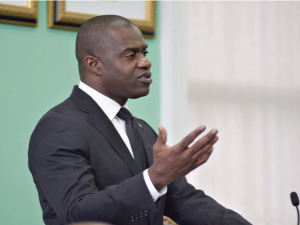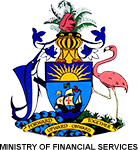Johnson: Trade could become third pillar of economy
16 Jun 2020

Minister of Financial Services, Trade and Industry and Immigration Elsworth Johnson
Trade can become an economic development tool for The Bahamas
The Bahamas is hoping to position itself to benefit from global value chains, by building up logistical infrastructure and trade agreements that would allow for partially manufactured products to be completed in the country, Minister of Financial Services, Trade and Industry and Immigration Elsworth Johnson said yesterday, adding that the introduction of this value-added trade strategy could eventually position trade as the third pillar of the Bahamian economy.
Johnson, who made the remarks during his 2020/2021 budget address in the House of Assembly, said The Bahamas has already adopted a value-added trade strategy and trade agreements that can allow this country market access as a value-added jurisdiction are being already being negotiated.
“The trade agreements which we have been busy negotiating can provide the necessary market access for those goods and services,” Johnson said.
“Additionally, capitalizing on the potential opportunities which could exist from participating in global value chains provides a tangible opportunity for trade to become an economic development tool for The Bahamas and to become the third pillar of our economy, providing new employment opportunities for Bahamians.”
Our trade logistics infrastructure is arguably the best in the hemisphere
Johnson contended that the infrastructure of Nassau and Freeport are already developed sufficiently enough for The Bahamas to enter the value chain.
“New Providence has seen significant infrastructural development… a deepwater harbor able to accommodate the largest of cruise ship vessels; modernized roadways, a state-of-the-art international airport; upgrades to our telecommunications infrastructure and the government’s e-government platform,” said Johnson.
“Freeport presently contains the necessary international trade logistics infrastructure for the creation of value-added trade centers.
“The trade logistics infrastructure is arguably the best in the hemisphere. Freeport has the largest deepwater harbor in the hemisphere and operates a container port and transshipment terminal with the existing capacity to receive the anticipated Panamex ships expected with the expansion of the Panama Canal. There is also the shipyard repair facilities located in Freeport.”
A value-added trade strategy can contribute to the diversification of the economy
According to Johnson, this value-added trade supply chain “phenomenon” is one The Bahamas must implement as it seeks to diversify its economy in the aftermath of the coronavirus (COVID-19).
“The fact is that global trading trends are not supportive of a traditional industry concept of manufacturing a product from the ground up, meaning that one jurisdiction creates an entire product for export.
“There is a considerable demand for jurisdictions where inputs from various countries are brought together at a trade center, where the production process might be advanced or completed,” said Johnson.
“Such partial or finished products are then exported globally.
“A value-added trade strategy is one that seeks to increase the value of a product at each stage of production, utilizing both trade in goods and services. It has the potential of leveling our trade balances by simultaneously increasing our export of goods, namely the value-added product, and services, for example distribution, transportation and professional services.
“The Ministry of Financial Services, Trade and Industry and Immigration believes that The Bahamas has the infrastructure to place it in the middle of the value chain.”
Source: Nassau Guardian

